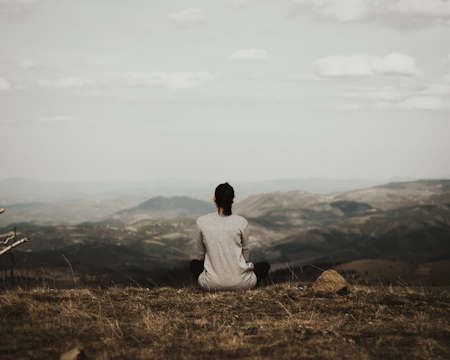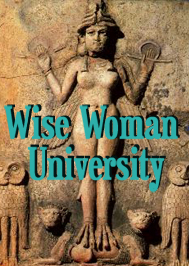
As a teenaged girl I learned how not to cry, a legacy handed down through the women in my family for generations. Stiff upper-lipped working class British women did not cry. It was in my fortieth year that I began the path back to the beauty and sacredness of my tears. I was apprenticing for five months to a powerful teacher. Nearly every time we would sit in a workshop circle to speak, I would begin to weep. By the time the talking stick got to me I'd be starting already and would choke back sobs as I struggled to get out what I had to say, which was rarely about my weeping. I thought of my tears as a huge annoyance and just wished they would stop. They were chokingly difficult, embarrassing, and I just spoke through them, apologetically and with my head hanging, at least in my mind.
A few weeks into my apprenticeship I finally "got" one of the truths about sacredness, that everything can be regarded as sacred. So I began to start to think about how to begin to start to think about understanding how to begin to start to think of my tears as sacred . A labyrinth of a sentence to describe a labyrinth of a process. Of course I passionately wanted the tears to just go away, but I was unable to make that happen. So instead I passionately chose a completely different path, one of honoring my crying, taking in crying as nourishment, looking for the gifts of my tears. Around that time I found a quotation, perhaps by Hildegarde of Bingen, that said something about tears being the aroma of holy work. That really made me cry, which I noticed as well. I began to craft a theory for myself that said when new parts of me opened, they would be ritually bathed in my tears. I spoke about this in circle and about my growing power to offer my tears in beauty. I wrote this poem upon witnessing, in a ritual once, a remarkable woman who had done some work in this regard.
Priestess
The woman in the jaguar mask
knew why she was there;
Felt every step of her journey from scared to sacred
As she stood holding the heart of our circle
From her own place on the circumference.
We all sang generously as the small fire in the center
Licked at our boats of curled white bark,
At the leaves inside, cargoes of cast-off baggage
Set free to the passion of immolation!
As we sang deeply to open ourselves, her unscheduled solo began.
It was a soft moan wrapped in a slow wail,
Her voice weaving the sounds in
With the music of our chant.
Staccato sobs suddenly tripped my heart on
The keening roller coaster ride.
Her lips spread in a narrow grimace gate,
We heard the pain rushing through.
The sounds tumbled us
Into old sorrowful corners,
Sang us the tune of
Our own lamentations.
And the tears that spilled from her eyes
Scalded all our hearts with grace.
I come to wisdom about grief from another path as well. In my work with the four directions I have discovered emotional attributes there; perhaps some essential qualities about each direction that touch me in a particular emotional spectrum. It makes perfect sense, if I am a being of Earth. I have taken on the task of honoring these essential qualities in circle and they have grown in power for me. West is the direction of Grief and Joy, all the stories in between, of sadness and loss and openings and letting go and the mystery of love . In the West, Kwan Yin slowly practices Ta'i Ch'i as her soft brown eyes speak compassion to our hearts, offer arms to hold us as we grieve. Kwan Yin tells us that when grieving is held as sacred, women will be safe once again.
Divine Mother Kwan Yin (1)
May I walk in peace and gladness, May I walk in mercy,
May I walk in peace and gladness, May I walk in mercy.
Divine Mother Kwan Yin, may this heart be home to you,
Divine Mother Kwan Yin, may this heart be home to you.
Grief is a normal complex response to loss. Loss of life of course, but also loss of innocence or trust, loss of hope or safety, loss of our way, so many losses. The small losses of life are rehearsals for the larger and largest ones.
In our bodies, grief can be a physical presence if we hold it in - in our muscles, in our throats, our bellies, our breasts, our hearts, etc. Emotions exist and travel in waves, or spirals. The word emotion comes from the Latin emovere , meaning to shake or stir up, to move out. I believe emotions arise in our heart and, as their name states, ideally move through us and out. Transforming us as they move, often moving us to action.
It is essential to process grief over time, to literally move it through our bodies. When we hold onto unfinished waves of grief, or any emotion, those unfinished waves have a charge, which grows over time. They can take up residence in many parts of us, affecting our flexibility-spiritually, physically and emotionally. These accumulations are not toxins, needing to be cleansed. Instead they are memories and reminders of unfinished business. If we do not experience the transformative powers of feeling our own emotions, we are unfinished, we are not yet mature. Emotions ripen us.
In her book Music and Women, (2) Sophie Drinker speaks eloquently of ancient and traditional religions who knew the importance of honoring grief.
"It is easy for us to misunderstand these primitive wail songs because, with our overintellectualized and overdepartmentalized approach to music and to life, we have lost the simple yet profound consciousness of the oneness of joy and pain, of birth and death, that is in them.
The wail alone..... sounds mournful in our ears. To observers of women who sing with tears streaming down their faces, it may seem an expression of inconsolable grief. But its intent is actually to ensure rebirth." (3)
The traditional women she spoke of in her book often used sound to move the energy. Keening is a sound of wailing practiced by Irish women at wakes and funerals. Arab women have used wailing for centuries; there are strong traditions in Islamic countries where such practices still live. Women of many other countries - Greece, Italy, Sicily, Eastern Europe, China, the Pacific Island nations, etc. - also use wailing, wild crying, moaning and other sounds to express the pain, and to speak out loud for the community's grief. Some teachings of the Mayan culture say that grief and praise come from the same place. Grief is thought of as praise for what we have lost, and praise is not sincere unless the realization of mortality and loss is brought to it.
For a few years I searched in vain for someone to teach me how to wail. I also searched for those sounds within myself and in circle with other women. In workshops and rituals we invited and evoked the sounds in different ways. Spontaneous crying is not the same as formalized grieving, so we have sought specific sounds of grief together. As students of women's mysteries, we consciously asked to remember the sounds of grieving. Within chants we found musical phrases that sounded like moaning or wailing. We sang them over and over so we knew the sounds, knew the pathways in our throats. Then we would do a ritual for this work, taking on the roles of the wailing women. It has felt like a learning and a remembering.
What do we wail for? We often call upon a grief we all share, a grief for the hurts and violence around children, around women and the earth, around animals, the loss of species because of greed. Or we mourn all the witches who have died from hate and intolerance, Or we mourn those who have died unmourned, forgotten and alone. There is never a lack of reasons to grieve.
In a women's circle, the grieving feels like old territory, ancient knowing. Everyone holds the space; some women weep or cry or moan, some sob quietly or loudly, some stare in silence, some drum or chant, some move and some stand still, each holding a place in honor for the tears and the grief. Loss is part of life. When the fabric of our family, community, world is rent by loss, grieving helps reweave the torn places. Whether we make the sound or hear it, something shifts in our nervous system. One of the reasons an infant cries is to reorganize its new nervous system, particularly if he or she has been taking in a great deal of information. It makes sense for adults as well; loss is a lot to take in.
When we love, we open our hearts to take someone in. When we lose them, we must open our hearts to let them out, more difficult since our stories and lives are woven with theirs. The sounds help to shift the grief so it is reorganized, not all of it, but enough to make room for life to continue and eventually, for joy again. It is an enormous gift of our tears, the capacity for more joy.
When we hold something as sacred, we don't try to ignore it, or medicate it or run from it. What is sacred is respected and held in wholeness and holiness. What is sacred is safe. When we have the support of friends and family in our grieving, we are not alone. Grieving together truly makes community and helps heal pain as we gather to tell praises and stories of beauty about the one we have lost.
Wanting to do magic to heal the spiral of life that is my family, I have wailed for my grandmother and her sisters. For my grandmother's mother, whose name I share. I offer my wailing to the women long dead in my family, and their many many unshed tears. Blessed be the tears of the women. Let us all make such offerings to our ancestors who could not weep. Let it be in beauty. Let it be in sacredness. Let it be for the healing of all.
Footnotes:
(1) lyrics to "Divine Mother Kwan Yin", a chant by Marie Summerwood copyright 1999
(2) Music and Women, by Sophie Drinker, The Feminist Press at The City University of New York, 1948
(3) Music and Women, page 26


 The Wise Woman University (WWU) is a sacred distance learning environment for the reweaving of the healing cloak of the Ancients.
The Wise Woman University (WWU) is a sacred distance learning environment for the reweaving of the healing cloak of the Ancients.

